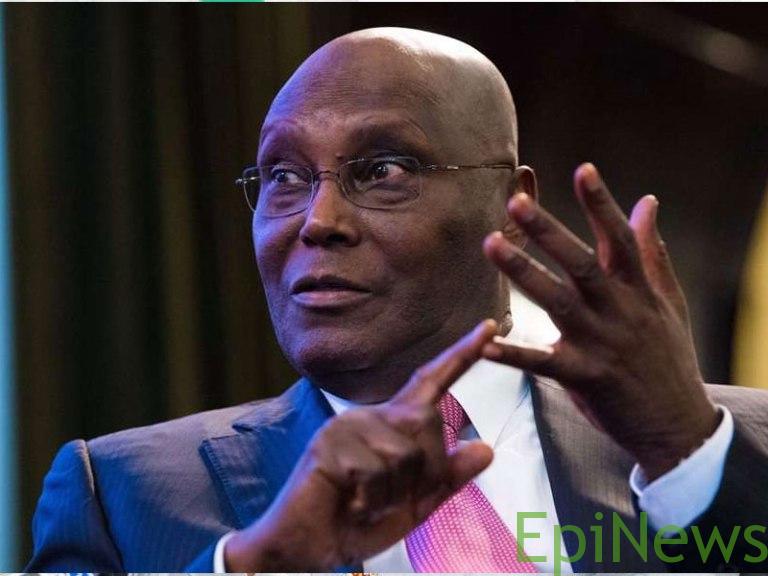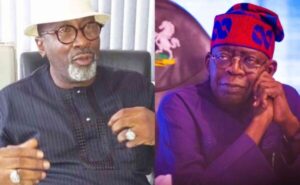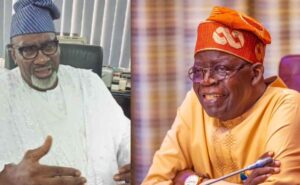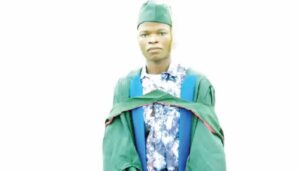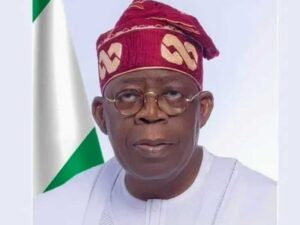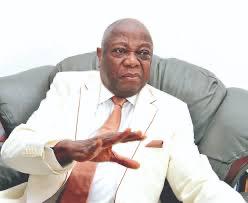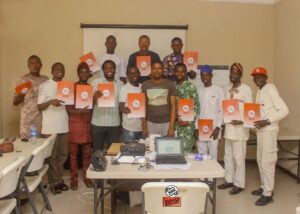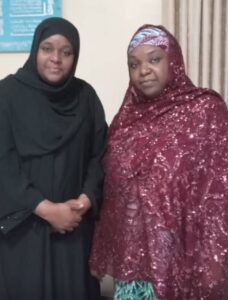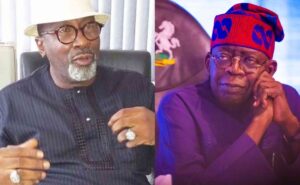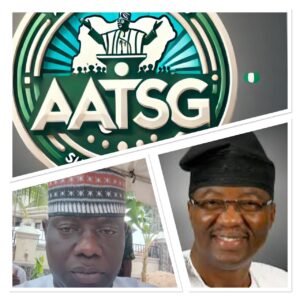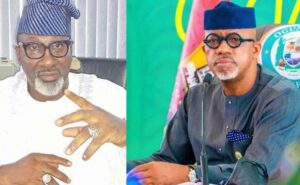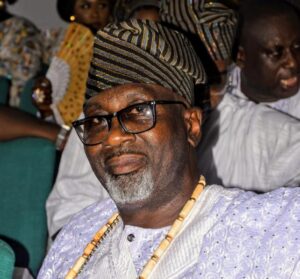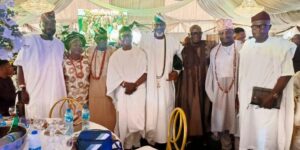Revealed: Inside Story Of How And Why Atiku Left Nigeria Customs 30 Years Ago. The story has been told of how and why presidential aspirant, Atiku Abubakar left the Nigeria Customs Service some 30 years ago.
About six weeks to the 2019 presidential election, most Nigerians are probably unaware of the circumstances under which one of the frontrunners, Atiku Abubakar, left his first public service career 30 years ago. Mr Abubakar is the candidate of the Peoples Democratic Party (PDP) on which platform he served as vice president between 1999 and 2007.
He has also been adopted by about four dozen minor parties under the Coalition of United Political Parties (CUPP), making him the main challenger to President Muhammadu Buhari who is seeking re-election on the ticket of the ruling All Progressives Congress (APC).
Mr Abubakar will be standing in the crucial election almost three decades after he left the then Department of Customs and Excise on April 30, 1989, over his disappointment at being denied the top position in the agency; and the lure of politics. He had joined the agency as a Cadet Assistant Superintendent on June 30, 1969, a few weeks after taking a diploma in Law at the Institute of Administration of the Ahmadu Bello University, Zaria.
When he joined the Customs at the age of 23 years, he had drawn a graph anticipating his career progression from Cadet to heading the agency by age 40. “I told myself that if by the time I was 40 years old I did not head the organisation, I would quit,” Mr Abubakar said in his authorised biography, ATIKU: The Story of Atiku Abubakar.
The 338-page book was written and published in 2006 by the late Adinoyi Onukaba, who at the time was Mr Abubakar’s Senior Special Assistant on Media. According to the accounts of Mr Onukaba, who died in 2017 while trying to escape a roadblock by armed robbers in Ondo State, Mr Abubakar’s joining the Customs was fortuitous. Fortuitous entrance into Customs It was the period of the Nigerian civil war which broke out in 1967 as an immediate consequence of the first military coup of January 15, 1966, that sacked the Nigerian First Republic and the counter-coup that followed six months later. “As the war raged on, some radical university students did not feel comfortable with the general indifference of Nigerian students to the unfolding tragedy in the country,” Mr Onukaba stated in the book. “They began to mobilise their colleagues in support of the war to keep Nigeria one. There were demonstrations by students in support of the Federal Government. From Zaria, Atiku and other students marched to Kaduna to demonstrate against French support for Biafra.
Twice they were arrested and detained briefly by the police.“One day after participating in a protest in front of the French Consulate in Kaduna, Atiku marched off to the headquarters of the First Division of the Nigerian Army in Kaduna to sign up for the war. He told the recruiting officers to take him, that he was ready to go to the war front to fight. The officers took a long look at him and then dismissed him: ‘We are looking for school certificate holders and not undergraduates.’“Atiku, frustrated and disappointed, headed back to Zaria.“Before completing his diploma in Law programme in June 1969, a team from the Federal Civil Service Commission came on a recruitment drive to the university. The departure of Ibo from the Federal Civil Service and federal agencies and parastatals had left many vacancies. The team was touring Nigerian universities to interview graduating students interested in filling up such vacant positions.“Atiku attended the interview.
By chance one of the interviewers found in his file a report that he had been found suitable to join the police force and had in fact received some training in 1966.
This information was brought to the attention of the chairman of the interview panel who promptly ruled: ‘O.k., you go to the Department of Customs and Excise.’“That was how Atiku joined the Customs in June 1966.”
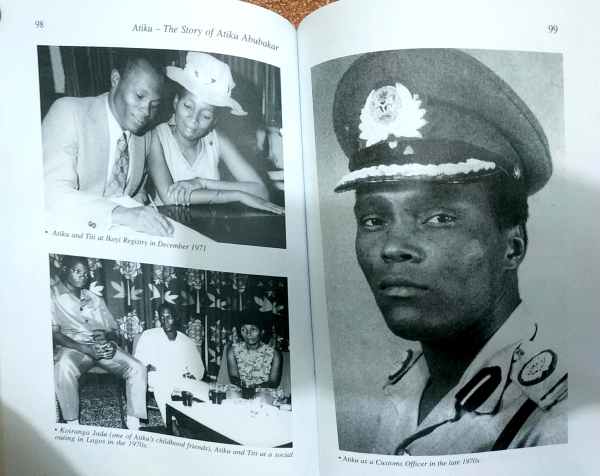
Bitter Disappointment Fast-forward to 18 years later in 1987 and Mr Abubakar was appointed Deputy Director of Customs and Excise in charge of Enforcement and Drugs. As one of the six deputy directors, he was in the line of succession to the post of Director, as the head of the agency was then known. The incumbent, Abubakar Musa, was his friend but their relationship was no longer cordial. “Despite having played a role in Musa’s appointment by lobbying two key ministers (in the Second Republic), Ali Baba and Abubakar Iro Dan Musa, Atiku felt that as Director of Customs Musa surrounded himself with people who were telling him that he (Atiku) was after his job.“For eight years Atiku was kept on one rank – Assistant Comptroller.
He was disappointed that his friend could allow people to come in between them and destroy a relationship of many years. It was only after Musa was retired that Atiku was able to move up.“He was promoted thrice – from Assistant Comptroller to Deputy Comptroller, Comptroller and Deputy Director – on the same day by the then Minister of Internal Affairs, Brigadier John Shagaya, who oversaw Customs following the removal of Customs from the Federal Ministry of Finance.“In the unending reorganisation of the Department by successive governments, the Customs, Immigration and Prison Service Board (CIPB) was established with the Minister of Internal Affairs as Chairman. The Board was responsible for appointment, promotion and disciplining of Customs staff.
“In February 1988, the post of Director of Customs was moved from Level 16 to 17 while the six Deputy Directors were moved from Level 15 to 16. In addition, 18 Assistant Director positions were created on Level 15 and six zonal commands were set up as part of the decentralization of the service, which was aimed at facilitating quick decision-making.” Mr Abubakar hoped to be appointed Director after Mr Musa retired from service and Mr Shagaya recommended him for the appointment to the then military president, Ibrahim Babangida. His father-in-law, Aliyu Musdafa who was then the Lamido of Adamawa, also put in a word for him following which Mr Babangida assured the traditional ruler that he would do it. “High profile appointments, such as Director of Customs and Excise, are political. Merit counts but political connection counts more.
Atiku knew he had to lobby the right people and drop hints at the right places that he was available to lead the Customs,” Mr Onukaba wrote. Mr Abubakar was confident of bagging the appointment, more so too that he counted the military president among his friends. “Atiku had known Babangida since 1974 when he was just a Major. They met at a party in Lagos, and became good friends. In 1982 when Babangida, then a Major-General, imported a BMW car into the country, it was his friend, Atiku, who helped him to clear it from the Lagos ports. Babangida was not the only top military officer or prominent civil servant that Atiku had assisted.” Mr Abubakar narrated to the author:
“They would import cars and come and hand over the documents to me. I paid duties on those cars from my own pocket. What could I do? They were all my friends and they did not want to go through the hassles at the ports. Being the man on the ground, they wanted me to do that for them. I enjoy helping people.” According to Mr Onukaba, “Since taking over power in 1985, Atiku had not asked him (Mr Babangida) for anything.
The only matter before him was Shagaya’s recommendation for him (Atiku) to be appointed Director of Customs. It was a position for which he felt he was eminently qualified. He thought Babangida would not hesitate to give it to him.“Indeed, Babangida approved Shagaya’s recommendation. But before it could be made public, a group of eminent Gongola State (the state was later broken into the current Adamawa and Taraba states) indigenes in his government pleaded with the President to drop Atiku.“They said there were already too many functionaries of the administration from the state. If Atiku were appointed, they said, other states would protest the preponderance of Gongola State people in top government positions.
“At the time, the Inspector-General of Police, Mohammed Gambo-Jimeta, the Chief of Air Staff, Ibrahim Alfa, and the Minister of Education, Jubril Aminu, were the most visible members of the government from the state. Murtala Nyako, then a Vice Admiral, was hoping to be made the Chief of Naval Staff. He might have also felt that giving the Customs top job to Atiku could affect his chances.
“Some people considered Atiku already too powerful and uncontrollable in the state and they felt that making him the Director of Customs would give him too much clout. Atiku was seen as an upstart, a boy from nowhere who was already threatening those who saw themselves as the power brokers in Gongola State.’ They did not want somebody outside their circle to rise,’ was how an observer put it in an interview.“Babangida yielded to pressure from those people and appointed an outsider, Dr Bello Haliru Mohammed, as Director.“ Mr Mohammed would later become National Chairman of the PDP.“Naturally, Atiku was disappointed. From that period, Atiku said he could not trust Babangida again. He felt Babangida was not firm and reliable. It was not the first time that Babangida had disappointed both Atiku and the Lamido of Adamawa.”
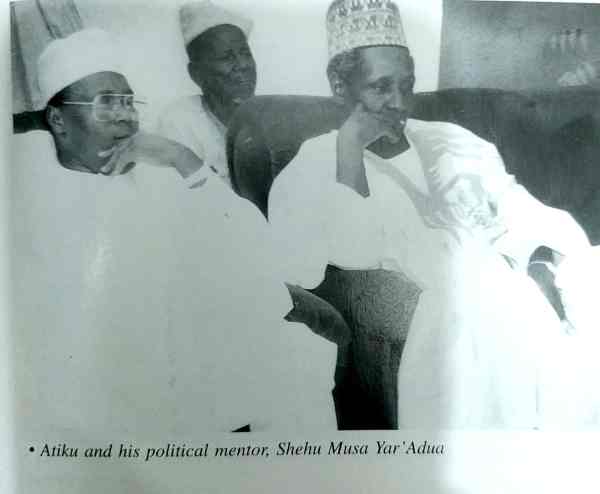
Mr Abubakar found working under his new boss, Mr Mohammed, “most frustrating.” According to the book, “Mohammed was not comfortable with having around him someone who had competed with him for the same position. He felt he could never trust Atiku and that Atiku would not be loyal and committed to his success in the job. He wanted Atiku gone.“Thrice he recommended him for retirement, but thrice Shagaya turned it down. Atiku went to see Shagaya and told him that he would like to leave service voluntarily because he did not want to be disgraced out of office. Shagaya advised him not to quit.
Atiku had at least 10 more years to go in the service and Shagaya felt he could still head the agency before his retirement.“But Atiku’s soul was no longer in the Customs. He needed to move on. He had always wanted to work for himself anyway. He asked for his annual leave and it was approved. He left for the lesser hajj in Mecca, Saudi Arabia.“Before his departure, Atiku had written his resignation letter (dated April 28, 1989), put it in an envelope, sealed and given it to his friend, Adamu Yaro, to hand it personally to Bello Mohammed, his boss.”“He enclosed in the letter the receipt of the payment into government treasury of his three months’ salary in lieu of notice.“Atiku had by then packed out of his Reeve Road official flat in Ikoyi and moved into a spacious, furnished guesthouse owned by NICOTES (his oil services company) on Bourdillon Road in Ikoyi.”
He had established Nigeria Container Services (NICOTES) with an Italian friend, Gabrielle Volpi in 1982 while serving as Customs Area Administrator at the Apapa Ports. The company was later renamed INTELS after it was seized by the regime of late Head of State, Sani Abacha. The new name was retained after the company was returned to the original owners after the death of Mr Abacha. Politics: You will run Nigeria by age 52“One of those Atiku consulted about his planned resignation was his old friend from Apapa Ports, Oyewole Fashawe. He visited Fashawe at Owo, his hometown. Like most of his friends, Fashawe advised him not to rush out of Customs until he had served as Director.
But Mrs Lydia Ijamolayemi, Fashawe’s mother, had a different opinion. She advised Atiku to leave the Customs and embark on the journey God has destined for him.“Five years earlier, she had visited Atiku in his office in Lagos and predicted that Atiku would be presiding over the affairs of Nigeria by age of 52 to 55 years. The matriarch of the Fashawe family was well known all over Owo and beyond as an extraordinarily gifted seer.”
Mr Abubakar jumped into politics at the deep end of the pool. In fact, he was attending meetings of the political association of his friend and business associate, Shehu Musa Yar’Adua, a year before he quit the Customs. Mr Yar’Adua had retired from the Nigerian Army as a Major-General in 1979 after serving as Chief of Staff, Supreme Headquarters between 1976 and 1979. Mr Onukaba narrated how the paths of the two men crossed. How Atiku met Yar’Adua”While in office one day, Atiku was informed that Shehu Musa Yar’Adua, the retired Major-General and deputy to Obasanjo, was waiting to see him. Atiku invited him in. The General entered and they greeted each other warmly. It was the first time Atiku was meeting him. He was simple and humble.“Yar’Adua wanted an import license to bring beans from Niger Republic for sale in Nigeria. Since leaving office in 1979, the General had gone into business to keep body and soul together. His business included agriculture, banking, shipping and manufacturing. Some of them, such as agriculture, banking, shipping and manufacturing businesses had been disastrous, due largely to unstable government policies, mismanagement and inadequate supervision.
Now, the General wanted to try his hands at buying and selling.“Atiku told him that he would have to write an application to President Ibrahim Babangida for an import license. He showed him how to write it. Yar’Adua thanked him and left. He wrote the application as Atiku had advised and Babangida gave his approval.“He obtained the import license, imported the beans from Niger Republic, sold it and made a lot of money. He felt he needed to show appreciation to the Customs officer who had assisted him. He offered Atiku a token of appreciation, but Atiku declined, saying it was not necessary. He said he was just doing his job.“Yar’Adua was highly impressed. In an organisation known for its endemic corruption and other unethical deals, he was happy to find one decent officer.
From that day, a friendship developed between Yar’Adua and Atiku. They discovered they had a lot in common: they had both been big time farmers; both had interest in maritime business; and they shared a common vision for Nigeria.“Yar’Adua briefed him about his own efforts to build a grassroots political movement that would be the vanguard of a new Nigeria with a common purpose. He wanted Atiku to work with him to realise that vision.”
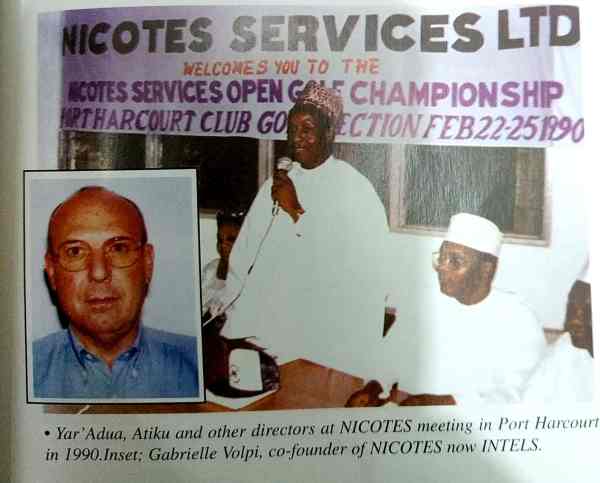
Mr Abubakar would later offer 20 per cent of the shares of NICOTES to Mr Yar’Adua. By that time, the company had turned into a multi-million dollars enterprise and made Mr Abubakar “fabulously wealthy.”Early involvement in politics In fact, Mr Abubakar’s involvement in partisan politics dated much further back to 1983 when he worked for the election of Bamanga Tukur of the then National Party of Nigeria as governor of the Gongola State. He said he had always been involved in the affairs of his immediate community in the state. “I was spending all the money I had to assist people and the community. If people needed employment, they came to me for assistance.
As much as our people appreciated my little contributions, I felt I was not doing enough. I began thinking seriously about the possibility of using political power to transform the lives of our people, of using political power to help more people and to continue to render social services, but this time, on a grander scale. Honestly, this was when I really began to consider going into politics after retiring from service,” Mr Abubakar explained. By 1988, Mr Abubakar had started attending regular meetings at Yar’Adua’s Ikoyi home.
Earlier in 1987, on the second anniversary of his coup, Mr Babangida set up a 46-member Constitution Review Committee and a Constituent Assembly to debate and adopt a new Constitution. He also created a National Electoral Commission (NEC) and placed a ban on past politicians from seeking and holding public office for 10 years effective from the date the ban on politics would be lifted. “While waiting for Babangida to lift the ban on politics, Yar’Adua and his group began to put together the structure of a political party. From Peoples Front of Nigeria to Social Democratic Party“A month after Atiku formally left the Customs, the Babangida administration lifted the ban on politics in May 1989. The President also announced a revised transition timetable that would lead to the establishment of elected civilian government on October 1, 1992.
“The Yar’Adua group immediately unveiled its political association, the People’s Front of Nigeria (PF). At its first national convention in June 1989, Atiku was elected one of the National Vice Chairmen of the party.“Atiku had won the position as a result of his substantial contributions to the association… Among the original founders of the association, he was the wealthiest and had one of the widest contacts. He and Yar’Adua paid the initial expenses of the PF.“Besides income from NICOTES, his oil servicing company, he had become a big time trader. With his friend, Peter Okocha, he imported green tea from China, long before the communist country became the favourite destination of many importers. Business was so good that Atiku bought three Mercedes Benz 600 series for himself, Okocha and Yar’Adua. Money as well as his personal qualities brought him respect and influence within PF.”“The PF was one of the 80 political associations that applied to NEC for registration in 1989.
Although NEC prequalified 13 of the associations and recommended them to Mr Babangida’s Armed Forces Ruling Council (AFRC) for approval, on October 7, 1989, Mr Babangida announced that the AFRC had decided not to register any of them because they were “set up by the same discredited politicians who must not be allowed back in power.” Instead, he set up two new parties, the Social Democratic Party (SDP) and the National Republican Convention (NRC) and asked politicians to join either of the two. Although Mr Yar’Adua, like other politicians, was shocked that Mr Babangida refused to register his association, he and his group later joined the SDP. That very year, Mr Abubakar ran a tempestuous race against his local political rival, Bala Takaya, for the SDP governorship ticket in Adamawa, which led to both of them being banned from the race by Mr Babangida. In 1993, he was drafted by the Yar’Adua group to run for the presidential ticket of the SDP, after Mr Yar’Adua had the previous year been banned following the cancellation of the party’s presidential primary which he was on the verge of winning.
He came third in the first ballot, behind the late Moshood Abiola and Babagana Kingibe. He supported Mr Abiola to win the race during the second ballot.

